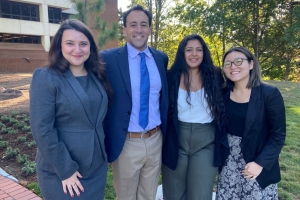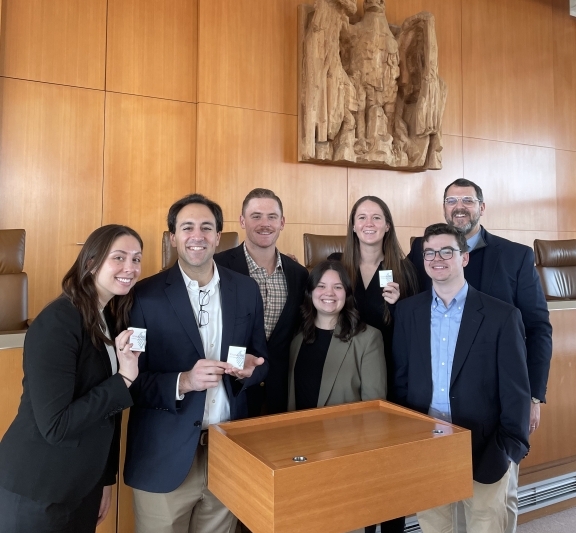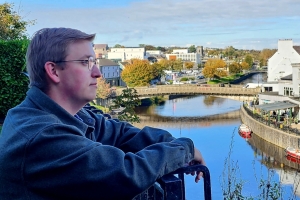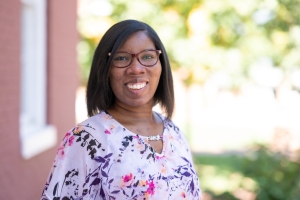
Reflections on the Rule of Law Academy Sabrina Callender-Clewett '25L writes about the German Law Journal's trip to Berlin.
Sabrina Callender-Clewett ’25L is a 2L at Washington and Lee School of Law. She received her undergraduate degree from Colgate University, majoring in Philosophy with a double minor in Economics and Environmental Studies. Before attending law school, Sabrina worked as a corporate paralegal in Washington, D.C. for three years.
Hosted in beautiful Berlin, Germany, the Rule of Law Academy brought together 18 law students from around the world to discuss comparative law methods, constitutional issues, state organization, and global concerns about “democratic backsliding.” The guiding question for the week’s intensive discussions was: “Can the law save democracy?” Alongside twelve international students from Kenya, Germany, Lebanon, Singapore, Senegal, Ecuador, and Romania, five other members of W&L’s German Law Journal (GLJ) and I shared the honor of engaging in conversations both around the seminar table and on our excursions together in the city of Berlin.
Participating in the Rule of Law Academy revealed just how significantly a country’s history factors into the way it structures and esteems the rule of law and democracy. That means that these national backgrounds are also central to understanding how a country might go about protecting its democracy. What works in one country to bring about and maintain democracy might not be relevant in another country. Employing the rule of law to protect and sustain democracy does not occur in a social or historical vacuum. Time and time again, through student-led discussions and presentations, participants were reminded of the importance of perspective. The open and honest contributions from students from across the globe helped reveal these different perspectives. As result, the group concluded that protecting democracy cannot, and should not, be a one-size-fits-all endeavor. Given the wide range of cultural and historical experiences across the globe, it seems likely that one method of protecting democracy would be effective and appropriate in one nation, but not in another.
Additionally, the factor of timing also proved to be a crucial consideration in protecting democracy. Throughout discussions, a goldilocks-like time zone appeared common. If actions were taken during this goldilocks zone, tools such as strong illiberal measures aimed at protecting democracy from authoritarians and cynics (what the Germans call “militant democracy”) might prove effective in furthering or protecting democracy. However, if these tools were employed either too early or too late, outside of the goldilocks zone, the same actions might fail or do more harm than good.
Struggling and analyzing different case studies through heated discussions, the Rule of Law Academy connected law students from around the world using the power of engaged conversation and in-person connection. The latter was facilitated by trips to the German Bundestag (Federal Parliament) and the German Federal Constitutional Court. Our learning during the week was not limited to just the classroom setting. My fellow participants and I were struck by the openness and thoughtfulness of Justice Radtke, who we met during our visit to the German Federal Constitutional Court.
Visiting these important institutions, the participating GLJ members all acutely noted how the architectural style of the buildings was very modern. Thinking back to the United States, we pondered if the often historical or neo-classical appearing character of the United States’ courts, Congress, and other government buildings, is perhaps a reflection of our nation’s youth. Trying to appear older and wiser, perhaps the United States values having its Congress and courts feel historical, even antiquated at times. In contrast, Germany seemed to want to appear modern, hip, and accessible to the people. This was evidenced through the much more modern architecture and furnishings in Germany’s government buildings.
Finally, at the end of our week in Berlin, we were engulfed in German culture as we ventured out to the Stadion An der Alten Forsterei for a football match between FC Union Berlin and the legendary Borussia Dortmund club. Thanks to the fierce beating of the drums, colorful jerseys, coordinated songs, and swaying of the passionate crowds, we all found ourselves cheering in German with a bratwurst in hand. My fellow classmates and I are all extremely thankful to have engaged with one another in such meaningful ways. I am confident that the sharing of knowledge and culture exchanged at the Rule of Law Academy in Berlin will be remembered by all for many years to come. Thanks to my experiences on the GLJ and at the Rule of Law Academy, I intend to seek out the power of perspective throughout my legal career, in order to more fully understand the matters at hand and how best to move forward.
 German Law Journal students traveled to Germany with Professor Russell Miller for the Rule of Law Academy.
German Law Journal students traveled to Germany with Professor Russell Miller for the Rule of Law Academy.


You must be logged in to post a comment.